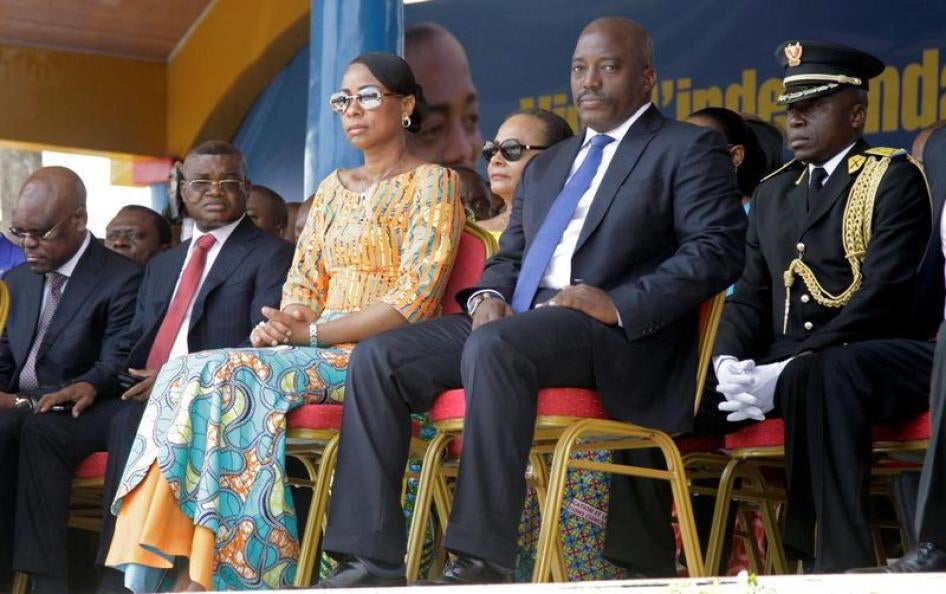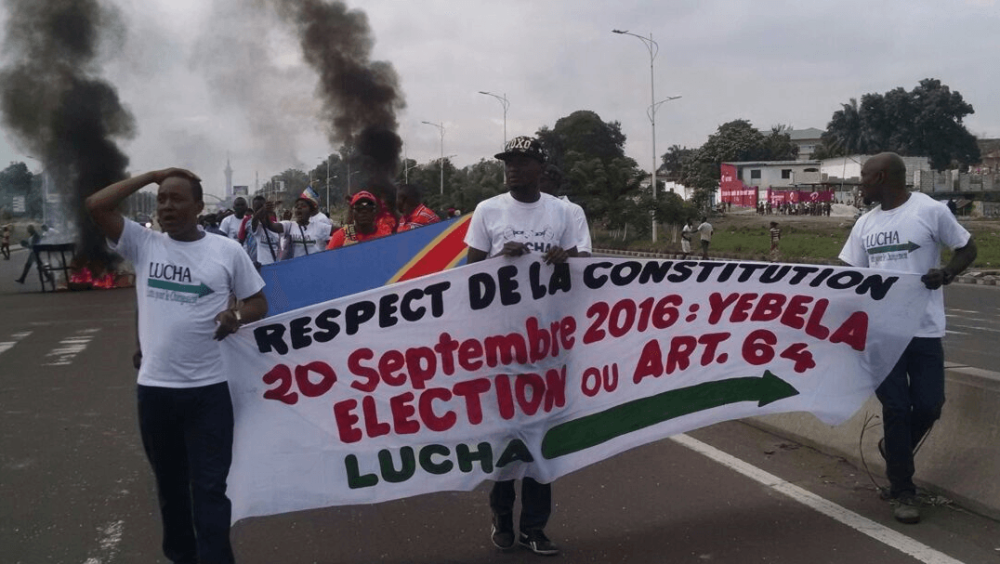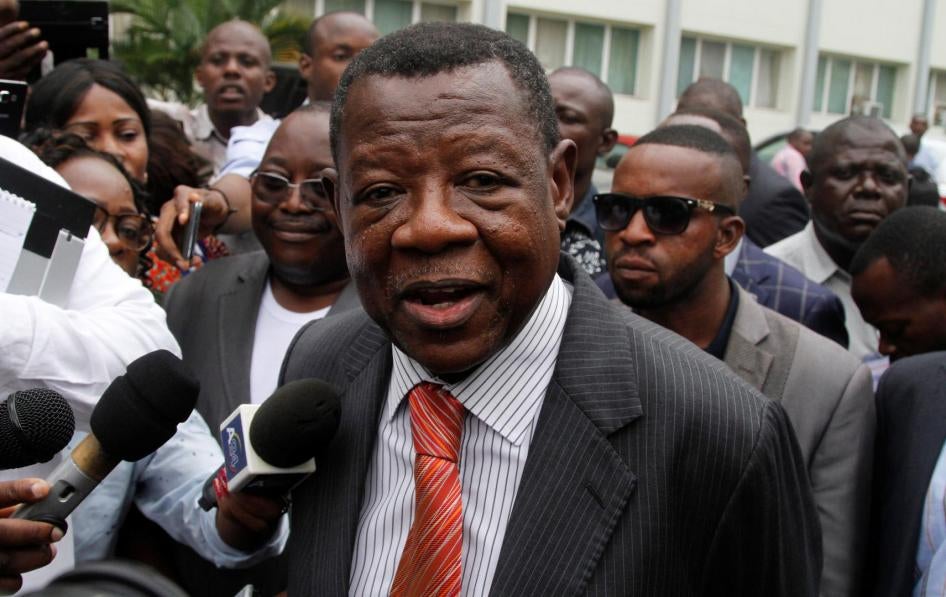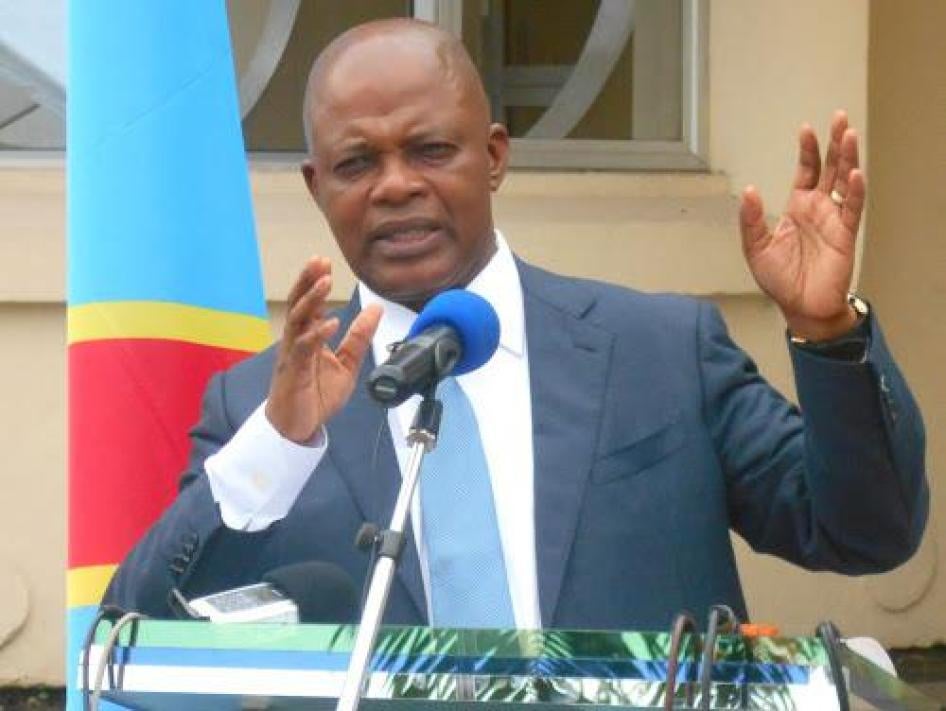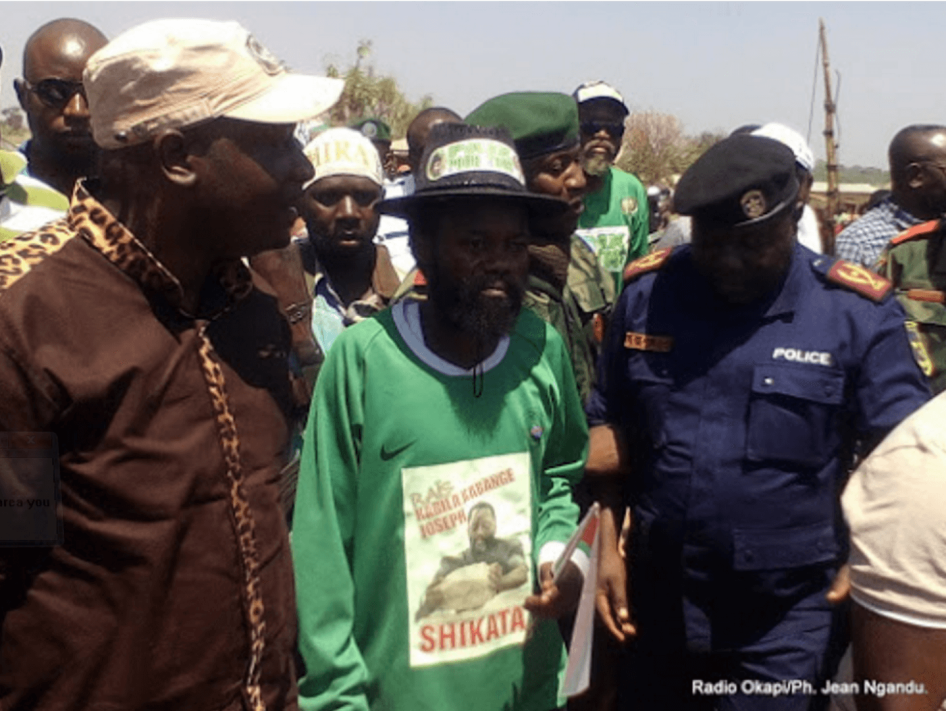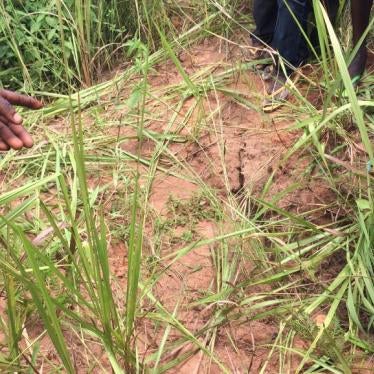(Washington) – The United States on June 1, 2017, imposed targeted sanctions against the personal military chief of staff of President Joseph Kabila of the Democratic Republic of Congo, Human Rights Watch said today. The US also imposed sanctions on a resort the adviser owns outside the capital, Kinshasa.
The US action follows new targeted sanctions announced by the European Union on May 29 against eight senior officials and a militia leader who have long been implicated in serious abuses in Congo. The sanctions include travel bans, assets freezes, and a ban on making funds or economic resources available to, or engaging in transactions with, the listed individuals and entity.
“The new US and EU targeted sanctions against top Congolese officials and business interests send a powerful message that there’s a high cost for the government’s violent repression of activists, journalists, and the political opposition,” said Ida Sawyer, Central Africa director at Human Rights Watch. “The sanctions signal that the most serious rights abusers and those delaying elections will have to pay a price, no matter their rank or position.”
President Kabila was due to step down at the end of his constitutionally mandated two-term limit on December 19, 2016, but he has held on to power as the vote to elect his successor has been delayed repeatedly.
The new US sanctions show that the business interests of powerful individuals involved in abuses can also be targeted, Human Rights Watch said. In 2016, the US sanctioned seven senior government and security force officials. The EU’s new sanctions reach higher up in the Kabila government than did its earlier sanctions. They target the head of the intelligence agency, two government ministers, a former minister, and two governors, in addition to two security force officers and a militia leader. In December 2016, the EU had sanctioned seven senior security force officers.
The US sanctioned Gen. François Olenga for his role as the head of the “military house” of the president, “which oversees the Republican Guard, an entity that has, or whose members have, engaged in actions or policies that undermine democratic processes or institutions” in Congo. The Safari Beach resort on the outskirts of Kinshasa was also listed “for being owned or controlled by Olenga.”
In a statement from the US Department of the Treasury’s Office of Foreign Assets Control (OFAC) announcing the new sanctions, OFAC Director John E. Smith said, “This action against Olenga sends a strong message that continued acts of violence, aggression, and suppression by the Congolese military against its own citizens are unacceptable. The United States is prepared to apply additional sanctions against those who undermine the DRC’s democratic or electoral processes.”
The EU sanctioned eight officials for “planning, directing, or committing” serious human rights violations: Kalev Mutondo, the intelligence chief; Évariste Boshab, the former vice prime minister and interior and security minister; Ramazani Shadari, the current vice prime minister and interior and security minister; Gédéon Kyungu Mutanga, a militia leader; Muhindo Akili Mundos, an army commander; Eric Ruhorimbere, another army commander; Jean-Claude Kazembe Musonda, governor of Haut Katanga province; and Alex Kande Mupompa, governor of Kasai Central province. The ninth, the communications and media minister and government spokesperson, Lambert Mende, was listed as being “responsible for the repressive media policy” in Congo, “which breaches the right to freedom of expression and information and undermines a consensual and peaceful solution towards the holding of elections.”
In its declaration announcing the new sanctions, the EU expressed concern about the “deterioration of the situation” in Congo, including the continued restrictions on “democratic space and fundamental rights,” as well as the crisis in the Kasai region, which “has reached an exceptional level in security and humanitarian terms and as regards human rights.”
The EU urged Congolese authorities “to act in compliance with human rights and fundamental freedoms and to initiate, without delay, credible and transparent investigations, flanked by high-level international expertise.” On the political front, the EU called for an electoral timetable, “genuinely inclusive transitional institutions,” swift implementation of “measures to ease tension,” and “space for unimpeded expression and debate.”
The EU noted that it will follow political and human rights developments closely over the next few months and stands ready to “consider additional restrictive measures or, conversely, withdraw some of them.”
In June 2016, the United States imposed targeted sanctions against Kinshasa’s police commissioner, Gen. Célestin Kanyama, and in September against Gen. Gabriel Amisi Kumba, commander for the western region of the Congolese army, and former police inspector John Numbi. In December, the US expanded the sanctions to then-Interior Minister Boshab and Mutondo, the intelligence chief.
In December 2016, the EU imposed targeted sanctions against General Amisi; Gen. Delphin Kahimbi, director of military intelligence; Gen. Ilunga Kampete, commander of the Republican Guard presidential security detail; General Kanyama; Roger Kibelisa, interior director of the National Intelligence Agency; Col. Ferdinand Ilunga Luyolo, commander of the anti-riot body known as the National Intervention Legion of the Congolese National Police (LENI); and former police inspector Numbi.
The United Nations Security Council has imposed targeted sanctions against numerous individuals and armed groups responsible for serious human rights abuses, mostly in eastern Congo, but it has not sanctioned senior officials involved in government repression.
Targeted sanctions against alleged rights abusers appear to have wide support in Congo, Human Rights Watch said. In a joint statement on April 27, 165 Congolese human rights organizations called for increased pressure and new targeted sanctions against top Congolese officials. A new nationally representative poll by the New York University-based Congo Research Group and a Congolese polling agency, the Bureau d’Études, de Recherches et de Consulting International (BERCI), found that 72 percent of all survey respondents approved of the targeted sanctions imposed by the US and EU against senior government and security forces officials last year.
The US and EU announcements come at a time when the prospect of democratic elections by year’s end in Congo, as agreed to in a New Year’s Eve agreement, seems to be fading. Congo’s ruling coalition has defied key tenets of the agreement, which lays the groundwork for elections, as political repression and large-scale human rights abuses continue unabated, Human Rights Watch said.
“Stronger international action and high-level engagement are needed to help prevent the situation in Congo from spiraling out of control,” Sawyer said. “The UN Security Council should also impose new individual sanctions targeting those responsible for abuses, while the African Union and regional leaders should press Kabila’s government to end abuses and urgently organize credible elections.”
Profile of the Individual Sanctioned by the US on June 1, 2017
François Olenga
Since 2014, François Olenga has been President Joseph Kabila’s personal military chief of staff and head of the so-called “military house” of the president, which has operational control over the Republican Guard, a force of 12,000 soldiers whose primary task is to guard the president. Under Congolese law, the Republican Guard has no responsibilities for maintaining public order, but, Republican Guard soldiers have repeatedly been involved in the violent crackdown on peaceful political demonstrations.
During protests in Kinshasa in January 2015, security forces fatally shot at least 38 people. Republican Guard soldiers were among those who fired live ammunition into crowds of demonstrators. Republican Guard forces also fired indiscriminately in a hospital, seriously wounding three people. Human Rights Watch also documented several instances in which Republican Guard soldiers took away the bodies of those shot in an apparent attempt to remove evidence of the killings.
Members of the Republican Guard presidential security detail – including some Republican Guard units deployed in police uniforms – were responsible for many abuses during the September 2016 demonstrations in Kinshasa. Republican Guard forces fired on demonstrators, and attacked and burned opposition party headquarters, burning to death several people. Security force officers told Human Rights Watch that orders were given to “suppress” or “crush” the demonstrations. Republican Guard soldiers who were deployed in Kinshasa the week of September 19 were allegedly paid bonuses on September 16 to motivate them for a strong response during the demonstrations, a security officer told Human Rights Watch.
In 2002, the United Nations accused Olenga of using profits from diamond mining to purchase weapons for the Congolese army. Olenga has been actively involved in importing weapons for the security forces in recent years, according to several security officials interviewed by Human Rights Watch.
Olenga also owns the well-known Safari Beach resort outside Kinshasa.
The US sanctioned both Olenga and Safari Beach on June 1, 2017.
Profiles of the 9 People Sanctioned by the EU on May 29, 2017
Kalev Mutondo
As the director of the National Intelligence Agency (ANR), Kalev Mutondo has been among the principal architects of the government’s drive to repress political dissent. Human Rights Watch interviewed more than a dozen government officials, members of President Joseph Kabila’s majority coalition, and security force officers over the past two and a half years about Mutondo’s role.
Mutondo’s intelligence agency arbitrarily arrested scores of human rights and pro-democracy youth activists and opposition leaders, many of whom were held incommunicado for weeks or months, without charge and without access to their families or lawyers. Some were tried on trumped-up charges – with Mutondo also allegedly playing a role in intimidating judges and dictating verdicts.
Some of those the intelligence agency detained in the government crackdown were badly mistreated or tortured, including with electric shocks and a form of near-drowning. Its agents have also repeatedly intimidated, threatened, and harassed activists, journalists, and opposition leaders or supporters, apparently as part of a broader campaign to spread fear and curtail their work.
Before an opposition demonstration in Kinshasa in September 2015, Mutondo was among several senior security and ruling party officials who allegedly hired men to assault peaceful protesters. Armed with clubs and wooden sticks, the assailants beat the demonstrators, spreading fear and chaos throughout the crowd of several thousand. Several recruits told Human Rights Watch that they had been called to a meeting with officials at a military camp in Kinshasa the night before, paid about US$65 each, and given instructions for conducting the attack.
Several senior government and security force officers told Human Rights Watch that Mutondo was the key official responsible for blocking the Human Rights Watch senior researcher Ida Sawyer from working in Congo, first in August 2016 and again in January 2017.
Mutondo was sanctioned by the US on December 12, 2016, and by the EU on May 29, 2017.
Lambert Mende
As communications and media minister and the government spokesman, Lambert Mende has been the public face of the government’s policy of repression against pro-democracy citizen movements, human rights organizations, and the political opposition. Mende has also allegedly been among those responsible for the crackdown on the media, arresting journalists and shutting down media outlets.
In January 2015, authorities shut down all internet and text message communication in Kinshasa and elsewhere after political demonstrations erupted across the country. Security forces killed at least 43 people during these protests.
On March 18, 2015, Mende publicly said that the leaders of the pro-democracy movement Filimbi were planning “terrorist activities” and a “violent insurrection.” A parliamentary commission later found that there was no evidence to support these claims.
On January 20, 2016, Mende ordered the closure of Nyota Radio Télévision and Télévision Mapendo, two television stations owned by opposition leader Moise Katumbi, on the basis that they had not complied with their tax obligations. The state-run media regulatory agency, the Higher Council for Broadcasting and Communication, said that taxes had been paid and called for the stations to be reopened. Both stations remain closed.
On November 5, 2016, ahead of planned public meetings in cities across Congo, authorities cut the signal for Radio France Internationale (RFI) in Kinshasa and the southern city of Lubumbashi, and jammed the signal for the United Nations-supported Radio Okapi. The Okapi signal was jammed for several days in parts of Kinshasa before being allowed back on the air. RFI was allowed back on the air in Lubumbashi, but it has now been blocked in Kinshasa for nearly seven months. By interfering with the signals of the two main radio stations in Congo, officials have blocked access for millions of people to credible, independent reporting. Mende sought to justify the move by claiming RFI had “transformed itself into the press attaché of the opposition.”
In an apparent attempt to block independent observers from documenting government repression during demonstrations in Kinshasa on September 19, 2016, security forces detained at least eight Congolese and international journalists – including an RFI journalist, an Agence France-Presse photographer, and two TV5 journalists. They were all released by the evening.
In advance of planned demonstrations across the country in December 2016, authorities blocked several media outlets on the morning of December 19. The authorities also instructed international telecommunication companies to shut down or block access to social media networks, in particular to prevent the sharing of photos and videos, including a video appeal on YouTube by the late opposition leader Etienne Tshisekedi to stop recognizing the authority of the president because his term had officially ended.
Security forces also detained or denied access to six international and Congolese journalists covering the protests in Kinshasa, Mbuji Mayi, and Goma between December 19 and 22, and expelled five Belgian journalists on December 16.
According to Reporters Without Borders, authorities have persecuted at least 63 journalists since January 2016. On November 7, for example, intelligence agents arrested the director general of the radio and TV station “Manika” and a colleague in Kolwezi, Lualaba province, after he broadcast an interview with the opposition leader Katumbi, whose soccer team Tout Puissant Mazembe won a match the day before. Both journalists were released the next day.
At least five Congolese media outlets close to the opposition remain blocked at the time of writing.
The youth league of Mende’s political party, the Convention of United Congolese (CCU), has also allegedly been involved in abuses. They were recruited alongside members of the People's Party for Reconstruction and Democracy (PPRD) youth league to disturb demonstrations in September 2016, according to members of the youth leagues interviewed by Human Rights Watch. The president of Mende’s party’s youth league also aggressively harassed the former United States special envoy, Tom Perriello, on the tarmac of Kinshasa’s Ndjili airport in September 2016.
Mende has repeatedly spread false information with his statements and obstructed efforts toward independent investigations. This was the case with the recent murders of the two UN experts and disappearances of their four Congolese colleagues. Mende told the media on March 28 that the body of the UN team’s interpreter had been found in the same grave containing the two UN experts, even though the UN said peacekeepers only found two bodies in the grave. This false statement caused confusion, and was frequently repeated in domestic and international news outlets. On April 14, Congo’s military prosecutor confirmed that only the two bodies of the UN experts had been found. On April 7, Mende claimed that Ida Sawyer of Human Rights Watch was implicated in the experts’ deaths, an unfounded accusation.
The EU imposed sanctions on Mende on May 29, 2017.
Évariste Boshab
As vice prime minister and interior and security minister from December 2014 to December 2016, Evariste Boshab played an important commanding role in the government’s repression. He was officially responsible for the police and security services and coordinating the work of provincial governors. These entities have repeatedly banned or repressed opposition demonstrations, jailed activists and political opponents, shut down media outlets, and blocked opposition leaders’ freedom of movement.
Before the demonstrations in Kinshasa on September 19, 2016, Boshab signed a communiqué that was presented on national television announcing that all demonstrations were banned and that anyone who went outside would “face the rigor of the law and the police would do its job.” Many interpreted this as a green light to the security forces to crack down on demonstrators.
After the crackdown on demonstrations in Kinshasa in January 2015 and in September 2016, Boshab’s office deployed police officers to the main morgue and instructed morgue employees not to provide any information to journalists or human rights defenders about the bodies of people killed during the protests, witnesses said.
Boshab has also been implicated in efforts to bar international and Congolese human rights organizations and pro-democracy movements from operating freely in Congo. On November 3, Boshab instructed all 26 governors to prohibit the citizen movements Filimbi and LUCHA from holding any activities because they were not legally registered groups. That runs counter to Congolese law, which does not require citizens to register their organization to hold a peaceful assembly.
Given his responsibility over customary affairs in Congo as interior minister, Boshab reportedly played a key role in escalating disputes about control over local chieftaincies in the Kasai region of central Congo. His unilateral decision to appoint scores of new customary chiefs in the area in late 2016 exacerbated an already tense situation and helped fuel the recent wave of violence, local activists said. Nearly 20 customary chiefs have been beheaded in Kasai Central in recent months, according to Congolese media reports. The UN reported that more than 1.3 million people have been displaced from their homes and at least between 500 and 1,000 people have been killed in the region since August 2016. Most are believed to have been killed by Congolese security forces.
Boshab was sanctioned by the US on December 12, 2016, and by the EU on May 29, 2017.
Ramazani Shadari
As vice prime minister and interior and security minister since late December 2016, Ramazani Shadari is officially responsible for the police and security services and coordinating the work of provincial governors. In this capacity, he bears some responsibility for the government’s failure to stop the excessive use of force by the army and police in the Kasai region and an apparent attempt to cover up or block independent investigations into over 42 graves that have recently been reported. He also has responsibility over the recent arrests of activists and opposition leaders and supporters since he became minister. Shadari also bears some responsibility for the violent crackdown on members of the Bundu dia Mayala movement in Kongo Central and Kinshasa in January and February 2017, in which over 20 people were killed by security forces, Human Rights Watch found.
As one of the main leaders of Kabila’s political party, the PPRD, Shadari is also one of the architects of “glissement,” or the extension of Kabila’s presidency beyond the end of his constitutionally mandated two-term limit. He made numerous declarations in 2015 and 2016 about how elections would not be held before the end of 2016 and in support of a constitutional referendum to allow Kabila to stay in power.
The EU imposed sanctions on Shadari on May 29, 2017.
Kyungu Mutanga, known as Gédéon
From 2002 to 2006, Gédéon led a militia that committed numerous atrocities in an area of central Katanga that soon became known as the “triangle of death.” As Gédéon’s group fought the Congolese army and terrorized local civilians whom they initially claimed to be defending, hundreds of people were killed and an estimated 150,000 forced to flee their homes. In some cases, Gédéon’s fighters publicly tortured victims before killing and cannibalizing them.
In 2006, Gédéon surrendered with about 150 fighters, most of them child soldiers. The government tried him for crimes against humanity in a landmark case for Congolese justice. In March 2009, he was convicted and sentenced to death. Gédéon escaped from prison in 2011. He went on to lead an armed group that carried out serious abuses in central Katanga for several years.
In October 2016, Gédéon surrendered again with about 100 of his fighters. Instead of arresting him, local officials in the provincial capital of Lubumbashi gave Gédéon a celebratory welcome. Gédéon wore a shirt with a photo of President Kabila and the slogan “Shikata” – which means “stay for a long time.”
According to the EU statement designating Gédéon, and a security force officer interviewed by Human Rights Watch, Gédéon’s fighters have more recently been involved in human rights abuses in the Kasai region and in supporting government forces committing human rights violations.
The EU imposed sanctions on Gédéon on May 29, 2017.
Brig. Gen. Muhindo Akili Mundos
Brigadier General Muhindo Akili Mundos was the Congolese army commander responsible for military operations against the Allied Democratic Forces (ADF), a Ugandan-led armed group responsible for serious abuses in eastern Congo, from August 2014 to June 2015. The UN Group of Experts found that he had recruited ADF fighters, former fighters from local armed groups known as Mai Mai, and others to establish a new armed group. This group was implicated in some of the massacres in Beni territory that began in October 2014, the experts said.
The EU imposed sanctions on Mundos on May 29, 2017.
Brig. Gen. Eric Ruhorimbere
As deputy commander of the 21st military region based in Mbuji-Mayi since September 2014, Brigadier Gen. Eric Ruhorimbere was responsible for the use of excessive force and extrajudicial killings by Congolese army soldiers in the Kasai region in recent months, the EU listing said. Ruhorimbere is a former member of the National Congress for the Defense of the People (CNDP), a Rwandan-backed armed group that was responsible for widespread abuses in eastern Congo between 2006 and 2008.
The EU imposed sanctions on Ruhorimbere on May 29, 2017.
Jean-Claude Kazembe Musonda
As governor of Haut Katanga province since March 2016, Jean-Claude Kazembe was responsible for the crackdown against the political opposition and human rights activists in the provincial capital, Lubumbashi. Security forces used excessive force against political protests and arbitrarily arrested opposition leaders and supporters and activists. Opposition political leaders, including Moise Katumbi and Gabriel Kyungu, faced politically motivated judicial proceedings. Kazembe also imposed an effective blanket ban on all political demonstrations organized by the opposition in Haut-Katanga in September 2015, and again in September 2016 – a measure that has remained in place ever since. Kazembe also participated in the ceremony welcoming Gédéon at his surrender in October 2016.
Kazembe was dismissed as governor following a unanimous vote of no confidence by Haut Katanga’s provincial assembly on April 18, 2017. The Constitutional Court, however, overruled this decision on May 26.
The EU imposed sanctions on Kazembe on May 29, 2017.
Alex Kande Mupompa
As governor of Kasai Central province since February 2013, Alex Kande shares responsibility for the security forces’ use of excessive force and the summary executions of suspected Kamuina Nsapu militia members and sympathizers. Since large-scale violence erupted in the Kasai region in August 2016, at least between 500 and 1,000 people have been killed, according to the UN. Most are believed to have been killed by government forces. Kande had previously refused to acknowledge the nomination of Jean-Pierre Mpandi as the new traditional chief for the Bajila Kasanga chieftaincy, which helped spark the violence in the Kasai region.
The EU imposed sanctions on Kande on May 29, 2017.
